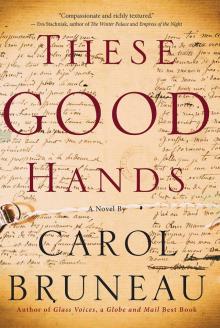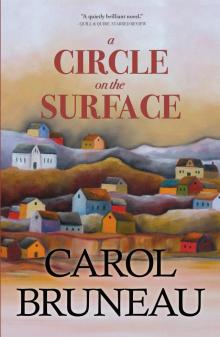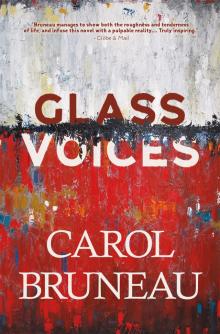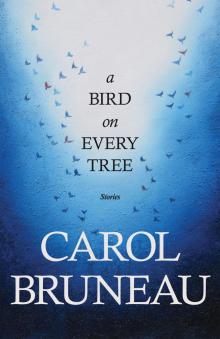- Home
- Carol Bruneau
Brighten the Corner Where You Are Page 2
Brighten the Corner Where You Are Read online
Page 2
I thought with a start he must be off to the almshouse, was after taking the shortcut out back—see how the mind plays tricks in the dead of night? He had not worked over there in three, going on four years by this time, which was roughly the last time I’d seen my friend Olive, the warden’s wife, when she finally realized it was no place to raise her boys. With a shiver of relief, I heard the creak of hinges from the shed nearest the house. It was where Ev liked to partake of his TNT cocktail, homebrew in the years before we had money, and then store bought later on.
Save that sharp creak, it was so quiet you could have heard a field mouse stir, the poor creature come in from the cold seeking a crumb or a smidge of warmth. Then, way out back, down by Seeley’s Brook or beyond it in the hills, a coyote yowled. Its cry echoed close but somehow distant at the same time. Yet from the pen by the shed came not a peep. Any other time Ev’s old mutt, Joe, would yap for a treat, especially if he spied someone else getting what he thought was his due—Joe was third or fourth in a long line of Joes, and he would bark his head off, it’s a fact. But not a yip sounded. Maybe Ev had obliged him before he could start a ruckus. For Ev loved that dog, loved spoiling him. Would have spoilt Matilda the crow, too, I do believe, if Matilda hadn’t set her sights on me.
From out back I heard another creak, then a thick, padded silence. The draft coming into the loft stirred the oilcloth Ev had tacked to the rafters. It was water-stained and worn but you could still see the sailing ship I’d painted on it. Filling its sag, the draft put wind in the sails. A muffled clang rang out, another and another, a clang like metal hitting rock. The sounds came in through the attic’s tiny gable window and echoed under the rafters. There was little to the roof’s pitch or its shingles and boards to dampen night noises or hinder the cold. The air in the loft held onto them, made them its own.
I wasn’t the sleeper I am now—not because of the cold, I was as used to the cold as a body gets. If I had trouble sleeping it was on account of my old companion, pain as loyal a bedmate as any man. Of course, it’s hard to sleep, alone or with company, when you lack the comfiest bed to lay in. Not that I am complaining, there’s no point complaining now. On this March night heavy with frost, I could have bunked down closer to the range, curled up on the daybed at the foot of the stairs. I would have been closer to my window then, ready to watch for Matilda coming to perch there after dawn.
But Ev had carried me up to the attic, one step at a time, and lifted me through the hatch. What good wife leaves the marriage bed to sleep alone?
Roused by the clangs, I let curiosity get the better of me. You know what they say about curiosity and cats. Concern for my husband was at the top of my mind. It was no mean feat to unfurl myself from the covers, slide out from the bed on hands and knees, and crawl across the cold, rough boards towards the hatch, a square hole a little less dim than the rest of the floor. Squared careful as could be on all fours, I went through the hole arse-first, taking each stair the way a tiny child would—the only way to manage their slant, especially in the pitch black. If I had taken the same amount of care later on I’d have saved myself grief, maybe even lived longer? On this occasion, I wasn’t even seized by the urge to pee, only the worry that something was wrong, that, like it or not, Ev might need me. But by the time I had reached the last stair from the bottom, my ladder-list of priorities had rearranged itself a little.
It was a chore getting up off my knees and onto my feet, but I managed. Downstairs was brighter than the loft, only because of the moonlight leaking in through both windows. It cast spiky shadows of the flowers on both sides of my windowpane, beaming in around their shapes on the glass. A paleness cracked in around the door, which stood unlatched and ajar, the draft from the road nudging it against the jamb. Any other cold night I’d have used the bucket under the stairs, and saved myself the trip to the outhouse. But on this frosty night worry pressed me forwards, said I ought to try killing two birds with one stone: have a pee and see what Ev was up to.
I felt my way past the range; there wasn’t a ghost of warmth from the fire’s embers. By the light of my husband’s window I gripped the back of his chair, sank one foot after another into my slippers, yanked my coat down from the hook, and squirmed into it. Pushing the door wide, I launched myself over the threshold onto the wooden doorstep, from there onto solid ground. Its iron cold pressed through my soles. It was frosty enough to warrant mitts. But even with my sleeves pulled down over them, my fists were so clumsy-cold reaching up I couldn’t even think of pegging the door shut behind me. Luckily it was a windless night, bitter but still. The stillness made each sound carry so. One good bang of the door and, oh yes, Ev would have come running.
He’d have been there like a shot, thinking that we had been burgled or I had taken a spell.
Well, he didn’t come. I followed the clangs, picking my way around back. The clangs were ringing out faster and heavier, echoing louder. I reached the outhouse, managed to climb inside and do my business, then made my way as quick as I could down the little slope behind it, past the old swing hanging useless from a tree branch. When I glanced back, the house shrank away like a boxy little ghost. From the swing it was a hop, skip, and a jump to Ev’s collection of sheds and lean-tos. Over the years, these had sprung up like toadstools around the one he did his drinking in, which was big enough to keep a car in. It was his hidey-hole from my nose-minding eyes, he would joke, if ever we got to tripping over each other in the house. Next to this shed was a tool shed stuffed with his treasures.
The clangs kept ringing upwards from the back lawn, though I still couldn’t see him. Back then that patch of yard was tufted in summer with thick dewy grass, now it’s all grown in with alders. At the time I speak of, it was half hid from the house by spruce and a twisty old apple tree Matilda and them had nested in one spring but abandoned for a big, tall pine handy the road. I stopped and stood in stripy moonlight listening to the ting of what I knew was a shovel gouging stones. Ev would be mad if he knew I’d gotten up and come down the stairs by my lonesome. Knowing it, my smarter self should have just slunk back to the tool shed, rested for a bit, then slipped back up to the house. Of course, a person could’ve disappeared in that shed, camouflaged by bits of fishing line, tire treads, rope, busted lobster pots, and cans, cans, and more cans, some empty and some still with paint. I could have let myself pass for flotsam and jetsam, what the sea spat up that month and all the months and years before. Or I could have just hightailed it best I could back to the house before he saw me.
For the last thing you wanted was to startle or annoy Ev, see his surprised look screw up into a scowl. Land, the things that would pour from his mouth if he thought you’d been watching him, especially if he was nursing a bottle or a tin full of money! “What the hell? You spying on me? I’ll learn you a thing or two about spying.”
But, lulled by the stillness, and my own curiosity I must admit, I crept closer, paused on a little rise of bare turf. There he was, leaning into his task. He grunted as he drove the shovel into the dirt. I was just close enough and angled just right to see his face full on, the determined look on it. A hot chill shimmied through me. He would have my hide for taking the stairs on my own. And the sight of him digging up the earth in the moonlight brought back a night but a year or two after we’d married, something I had promised myself well and good to forget. For what was the use of worrying about a thing you could do nothing about?
Whatever Ev was up to burying now, he could have waited for a solid, steady thaw to make the task easier. His impatience filled me with wonder. The same wonder held me there, froze, with just the length of a few yardsticks between us. My husband was a hard worker but never one to waste effort. Bent over his work now, he could have been a scarecrow, if scarecrows talked. For he was cussing under his breath. Cussing the rocks, tree roots, and frozen dirt. So much for him replacing me in Matilda’s affections, I thought. Most birds liked a gentler touch. Each clang of the sho
vel’s rusty blade could have jarred her and the other feathered ones from their sleep. I imagined her sassing him back, leading a chorus of rocks, roots, and turf all giving him what-for.
At his feet, something glinted in the moonlight. It was glass, what looked to be a preserving jar. Even from a distance I recognized it as the one my secretary had dropped off that afternoon, a jar of homemade mustard pickles. I hadn’t managed to get a taste but those pickles must have been some good, seeing how fast they’d disappeared. It was too nice a jar for storing worms—was Ev digging worms to go smelting? I wondered. Strange time to do it, waiting till sunup would’ve made more sense. With the ground hardly thawed, the robins hadn’t even arrived from down south. Ev aimed to beat them to a juicy tangle of worms? Wouldn’t put it past him, I thought. Ev was always trying to outdo someone or something. This included himself and the care he took with our money.
Of course, it’s easy to be critical. And it ain’t nice or useful to spy. I’d learned early in my life: what you don’t see won’t pester you. But, stepping back a ways from the moonlight, I stayed put on the rise and watched through the spruce boughs. Somehow, Matilda and her murder stayed asleep. After leaning heavy on the shovel, scooping and flinging away frost-spiked soil, Ev stooped to roust up with both hands a rock that didn’t want to give. Curiosity made me bolder, and the fact of what I’d done. If I could climb down those stairs, I could climb back up them too. I leaned into a stitch of moonlight for an even closer look.
Wiping his brow, Ev straightened up, yanked his cap forward, then scraped it backwards on his head. He took up the shovel, dug a bit more, then flung it down again and lifted up the jar. I didn’t need to tilt myself backwards to see something lining the bottom of it glinting, shiny and dull. If they’d been awake, Matilda and her cronies would have been all over it like one big flapping black shirt. Ev brought the jar to his lips—for one last lick of pickle juice or to kiss the jar for good luck? Crouching down, he planted it deep in the hole. He shovelled then kicked dirt over top of it, and clods of grass. His face had the same dull grey, frosty look as the trees and bushes around us.
I wanted to call out, I should have called out, but his look stopped me. Not a twig or creature stirred. It was always better to hold my tongue. I watched him do a comical little two-step, tamping down the dirt under his boots. It made me think of Joe burying bones or Matilda hiding peanuts from the blue jays. Of course I thought of people, too, in movies and songs and whatnot, burying things to keep what they didn’t want known out of sight and out of mind.
I breathed in a good big gulp of air, its hint of spruce gum a balm on my lungs. But as I did so I wobbled and stamped down hard on a fallen twig. It was no bigger than what I’d seen Matilda and them building their nest with, but the snap it made cracked the stillness.
Ev near dropped the shovel, looking up. His surprised holler rent the darkness, fiercer than cawing could have done. His eyes gleamed as they fixed on me. “You! What the jeezus are you doing out here?”
The yard and the woods dimmed to the same solid chill that lit all through me. What had possessed me to be here? I was in for it now.
“How the jeezus did you get down them stairs? Did I say you could leave the loft? How’d you get back here without me seeing you? The hell you think you’re doing, scaring me like this. Checking up on me. Like a goddamn bloodhound. You could have fell! Git back to the house, git back there now, before you bust something and catch your death of ammonia.”
Even years later, after I landed in hospital the last time, dying of that illness, do you think Ev could say the word pneumonia? But he was right, I should not have ventured down the stairs let alone outside in the dark. I should have stayed upstairs where I belonged, and I sure as heck shouldn’t have been watching him like this. And yet curiosity gripped me. Out the words popped, as unbidden as could be:
“What in God’s acre are you up to, Ev?”
Unleashed this way, my tongue betrayed me, as it had a few times before. The question startled Ev so bad he swung the shovel like a bat. The tops of his boots flubbed against his shins as he strode near. “What did you say, woman?” For half a second, how foolish, as he stood over me and I forced my gaze sideward, I half feared he would bring the shovel down on my head.
He peered down into my face and I could smell the liquor on him. “Look at your husband when he’s talking to you!”
With him standing there on the rise, I could not have done so if I’d wanted to. Of course, Ev had never landed a blow or laid a hurtful finger on me, not intentionally, and never would. But there is a first time for everything, I remembered someone saying on the radio, as Ev grabbed ahold of my sleeve. He must have felt me trembling. “I asked you, what did you say?”
“Nothing, Ev. You are hearing things, I didn’t say nothing.” I bit down on my treacherous tongue. Instead of staring at his chest I cast my eyes downwards. Matilda! I called out in my head, Wake up! Git down from your nest right now and witness this! Whatever happens, which of us do you want for a friend, him or me?
Only then did my fool brain come unfroze enough to remember that Matilda had begun brooding and would not leave the nest even if she wanted to.
Ev gave my arm a sharp tug, then let go. He barked out a laugh. “My, my, aren’t you the cat’s arse. Smart! Smart as all get-out, coming out and spying on your husband. Traipsing down here in the dark, coulda fell and broke a leg, then what? Missus Smarty Pants, thinking you can come and go as you please, all hours, risking life and limb.”
Of course he was right. If I busted something, how would we manage? I kept my trap shut. Keen as I was to get back to the house, don’t assume I thought his words didn’t merit an answer. It wasn’t the first time one of us had got riled up over nothing. Plenty to get riled up about in twenty-eight years of marriage. But, like the crows, I’d learned the value of keeping mum. Best just to bury the hatchet, like they used to say. As for burying stuff, you could count me just as guilty as Ev, I suppose, the two of us like Joe and all the dogs that came before Joe squirrelling away bones for later, always later.
A later that seldom came, I have since learned, until you found yourself fresh out of time.
Ev stayed put, gaping at me. Imagining Matilda’s saucy cry, I finally summoned the playful gumption to speak, and more gently this time. “What were you planting, anyways? Funny time to be planting. Awful cold, still so early in the season.”
But my playfulness didn’t help.
“You crazy thing. Crazy as a bag full of hammers. Coulda landed flat on your arse. Then you’d have been done for. Planting, all right—planting whatnot, for me to know and you to forget about. Creeping downstairs in the dark, so he’p me, you’ll get planted.” He grinned as he spoke, and shook his head indulgently.
Now, let me back up a little in my telling of this: it had dawned pretty quick what was in the jar, from what I’d glimpsed. A small silver collection: nickels, dimes, nothing dearer, perhaps, than quarters, no fifty-cent pieces or silver dollars. Silver with a coppery hint of gold? The dim gleam of a new penny or two was surely not the gleam of my ring. Yet I had merely caught this glimpse, mind; there could have been more. Paper. Tightly folded dollar bills or a message, the sort more usually poked inside a liquor bottle and cast into the sea. But I didn’t suppose Ev would take such pains over disposing a note—unless it was an IOU for a debt he wasn’t ready to call in or forgive and forget, but wished to lay to rest until such time as it was useful. A love letter, a farewell note, these amounted to the same for Ev, given that he couldn’t read.
I imagined Matilda stealing such a note, lining her nest with it.
Now, suppose that glint was my ring, the dearest, costliest thing the two of us had to call our own in all the world? Of course, it had been a dog’s age since I had worn it. For years now, my old paws had been way too swelled up to get it past the nail of any finger on either hand. Just because I didn’t we
ar it never meant I had no use for it.
“Now git back up to the house before I plant you!” As he hefted the shovel, Ev’s laugh was a hiss. I heard something stir in the bushes, a raccoon maybe. Swinging the shovel, he marched ahead, then stopped to heave it in amongst the loot in the tool shed.
As I watched the back of him bob towards the house—the red checks of his jacket dark as pitch—the sight made me brazen again. Reckless. “You eat all them pickles or what?” My voice carried as clear as the moon just beginning to pale overhead. “They’d have been nice on beans. We could’ve made them last a while. Secretary might need her jar back. Might think poorly of us just keeping it.”
He laughed over his shoulder. “That one? She’s got jars coming out her arse, I’ll bet. Wha’d I tell you about en’ertaining her? Huh?”
I coughed out a laugh that was hollow-sounding even to me, but didn’t say anything. Ev hardly gave a cock-a-doodle-doo about other people’s possessions. But he cared what they thought, and by that I mean letting them know we needed their help as much as we suffered their kindness. On the little slope close by the privy he spun round to face me, stumbling in his boots. “What’s so goddamn funny? That one takes advantage. Taking your paintings, paying four dollars for one she wanted, plus some old pickles for a tip? A real nice painting, too, wasn’t it, like you done for her other ‘friends.’ Make her and the rest of them mucky-mucks think you and your pitchers come cheap. Next they’ll be writing and askin’ us to give ’em away. Oh I got folks like her figured out, don’t worry. Sure she’s helpful. Sitting on a pile of cash where them four bucks come from.”

 These Good Hands
These Good Hands A Circle on the Surface
A Circle on the Surface Glass Voices
Glass Voices Berth
Berth Brighten the Corner Where You Are
Brighten the Corner Where You Are A bird on every tree
A bird on every tree